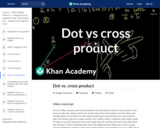
Understanding the differences between the dot and cross products. Created by Sal Khan.
- Subject:
- Physical Science
- Physics
- Material Type:
- Lesson
- Provider:
- Khan Academy
- Provider Set:
- Khan Academy
- Author:
- Sal Khan
- Date Added:
- 08/08/2008

Understanding the differences between the dot and cross products. Created by Sal Khan.
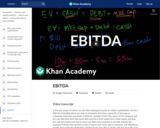
Review of Enterprise Value and comparing it to EBITDA. Created by Sal Khan.
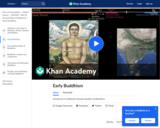
Introduction to Siddhartha Gautama Buddha and Buddhism.

An overview of the life and teachings of Jesus Christ and the birth of Christianity.
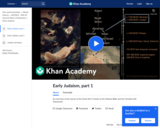
An overview of the stories of the Torah (first 5 books of the Hebrew Bible and the Christian Old Testament).
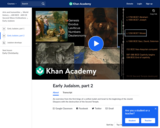
An overview from the first kings of a unified Judah and Israel to the beginning of the Jewish Diaspora with the destruction of the Second Temple.
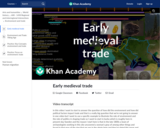
Is a ring from a ninth-century Viking grave a surprising find, or a reflection of the larger trade patterns in early medieval Europe and the Middle East? Vikings traded and raided throughout Europe and as far as the Abbasid Caliphate in the Middle East. Political circumstances and environmental factors shaped these patterns of trade.
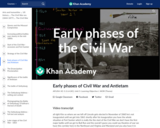
Early phases of the Civil War, from Bull Run to Antietam.

Earmarks, pork barrel projects and logrolling.
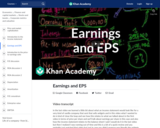
Earnings, EPS (earnings per share) and how they relate to the income statement and balance sheet. Created by Sal Khan.

Earth ƒ??was formed approximately 4.6 billion years ago, likely as the result of a supernova (star explosion). The debris from this explosion began to collapse in on itself due to gravity, forming the sun. Gravity continued to draw the remaining particles together, clumping them into larger bodies, ultimately forming Earth and the other planets in our solar system. Created by Sal Khan.

Communities are dynamic and change over time, and we can observe this process with particular clarity after a disturbance or on new land. Learn about primary and secondary succession, as well as pioneer species. Created by Sal Khan.

Ecology is the study of how living things interact with each other and their environment. This includes living things (biotic factors) and non-living things (abiotic factors).
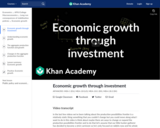
Economic growth is an expansion of the capacity to produce goods and services. Economists traditionally believed that expanding the stock of capital leads to economic growth. In this video, we explore the important link between investment and growth using the PPC model. Created by Sal Khan.
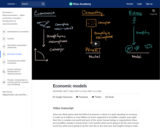
Economic models are a way of taking complicated ideas and events and breaking them down into their most important characteristics. We use models in economics so that we can focus our attention on a few things instead of getting bogged down a lot of details. In this video, learn more about the role that models play in economics, and the importance of the assumptions that underlie those models.
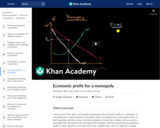
Learn about how to represent a monopoly market graphically in this video. Topics covered include the profit-maximizing quantity, pricing decisions, and deadweight loss associated with monopolies.
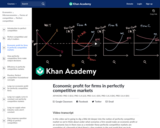
An important skill in microeconomics is the ability to find a firm's profit. Learn more about how to use a graph to identify the profit-maximizing quantity for a firm in a perfectly competitive market, and identify the area that represents the firm's profit or loss.
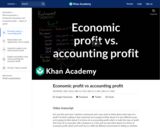
Accounting profit is what many people tend to think of when they think profit, but an economist would say that you leave something very important out when you do so: opportunity costs. In this video, explore the difference between a firm's accounting and economic profit. Created by Sal Khan.
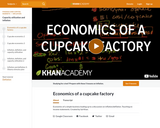
Economics of a simple business leading up to a discussion on inflation/deflation. Touching on income statements. Created by Sal Khan.
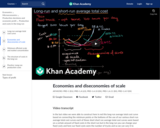
Economies of scale exist when long run average total cost decreases as output increases, diseconomies of scale occur when long run average total cost increases as output increases, and constant returns to scale occur when costs do not change as output increases.